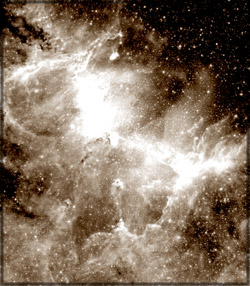"Cosmic rays not CO2 warming up the planet"
 The
impact of cosmic rays on the climate could be greater than scientists
suspect after experiments showed they may have a pivotal (important)
role in cloud formation. Researchers have managed to replicate (copy)
the effect of cosmic rays on the aerosols (sprays in cans) in the
atmosphere that help to create clouds. The
impact of cosmic rays on the climate could be greater than scientists
suspect after experiments showed they may have a pivotal (important)
role in cloud formation. Researchers have managed to replicate (copy)
the effect of cosmic rays on the aerosols (sprays in cans) in the
atmosphere that help to create clouds.
Henrick Svensmark, a weather scientist in Denmark, said the
experiments suggested that man's influence on global warming might be
rather less than was supposed by the bulk of scientific opinion.
Cosmic rays - radiation, or particles of energy, from stars, which
bombard (attack) the Earth - can create electrically charged ions in the
atmosphere that act as a magnet for water vapour, causing clouds to
form.
Dr. Svensmark suggests that the Sun, at a historically high level of
activity, is deflecting many of the cosmic
|

Cosmic rays
|
rays away from Earth and thus reducing the cloud cover.
Clouds reflect the Sun's rays back into space and are considered to
have an important cooling effect. However, if during periods of high
activity, the Sun's magnetic field pushes a greater proportion of cosmic
rays away from the Earth, fewer clouds will form.
The research, published in the journal Proceedings of the Royal
Society, concentrates on how ions (electrically charged particles) are
created and behave in the atmosphere when cosmic rays from stars hit it.
Cosmic rays were replicated by the use of ultraviolet light that were
turned on and off in both short bursts and long exposures to create
ions. The researchers found that the presence of ions encouraged the
formation of clusters of molecules.
In the atmosphere, these clusters of ozone, sulphur dioxide and water
are understood to act as aerosols in attracting water vapour,
culminating (ending) in the formation of clouds.
The number of clusters, according to the report, is proportionate to
the number of ions present, which in turn depends on the frequency of
cosmic rays reaching the Earth.
"The experiment indicates that ions play a role in nucleating new
particles in the atmosphere and that the rate of production is sensitive
to the rate of ion density", the report concluded. "One might expect to
find a relationship between ionisation and cloud properties.
This feature seems to be consistent with the present work".The report
added that the ions were likely to generate a reservoir of clusters of
aerosol molecules in the atmosphere that "are important for nucleation
processes in the atmosphere and ultimately cloud formation".
The findings are unlikely to change radically the views of mainstream
climatologists. Nevertheless, a team of scientists will shortly begin a
larger experiment at a particle accelerator in Europe in the hope of
learning more about the effects of cosmic rays on cloud cover.
According to the Intergovernmental Panel for Climate Change, by far
the biggest influence on climate change is the level of greenhouse gases
released by mankind, largely through the use of fossil fuels.
Peter Stott of the Met Office's Hadley Centre and one of Britain's
leading climate scientists, said that Dr. Svensmark's theory should be
taken "with a cellar of salt".
Small, localised effects on cloud formation might be possible, but he
dismissed the suggestion of cosmic rays being responsible for global
warming.
The Times of London |
